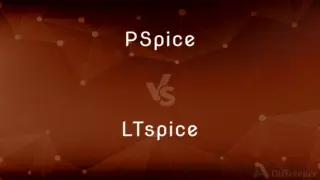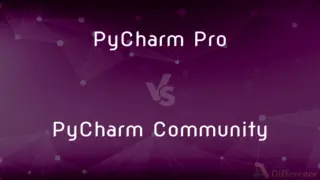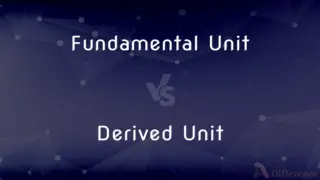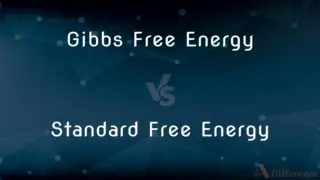Dilution vs. Concentration — What's the Difference?
By Tayyaba Rehman & Urooj Arif — Updated on March 20, 2024
Dilution involves adding solvent to decrease a solution's concentration, while concentration increases the solute amount or reduces the solvent.

Difference Between Dilution and Concentration
Table of Contents
ADVERTISEMENT
Key Differences
Dilution is the process of decreasing a solution's concentration by adding more solvent, such as water, without increasing the quantity of solute. This results in a lower ratio of solute to solvent. In contrast, concentrating a solution involves either adding more solute or removing some solvent, increasing the solute's proportion relative to the solvent.
When diluting a solution, the primary goal is often to achieve a desired concentration that is safer or more suitable for a particular use, such as diluting cleaning chemicals to safe levels. On the other hand, concentrating a solution can be aimed at enhancing its effectiveness, flavor, or reactivity, as seen in culinary processes or chemical reactions.
The concept of dilution is crucial in various fields, including chemistry, biology, and pharmacology, where precise solution concentrations are required for experiments, drug formulation, or product manufacturing. Concentration adjustments are equally important in these disciplines for creating effective, safe, and stable products or for analytical purposes.
Both dilution and concentration have implications for the properties of a solution, including its boiling point, freezing point, and osmotic pressure. Dilution typically leads to a decrease in these properties, aligning them closer to those of the pure solvent, whereas concentration increases these properties, making the solution behave more distinctly from the solvent.
Comparison Chart
Definition
Adding solvent to decrease solution concentration
Increasing solute amount or reducing solvent
ADVERTISEMENT
Purpose
To make a solution less concentrated for safety or utility
To enhance solution's effectiveness or flavor
Common Applications
Safety in chemical handling, drug dilution
Food industry, chemical synthesis
Impact on Properties
Decreases boiling point, osmotic pressure
Increases boiling point, osmotic pressure
Compare with Definitions
Dilution
Pharmacological Preparations.
Adjusting drug concentrations for patient-specific doses.
Concentration
Research and Development.
Concentrating samples for analytical or research purposes.
Dilution
Environmental Impact.
Reducing pollutant concentration in wastewater before disposal.
Concentration
Pharmaceuticals.
Concentrating active ingredients for more potent medication forms.
Dilution
Laboratory Procedures.
Preparing solutions of precise concentrations for experiments.
Concentration
Chemical Manufacturing.
Concentrating solutions for more efficient chemical reactions.
Dilution
Safety Measures.
Diluting bleach for household cleaning to safe levels.
Concentration
Food Industry.
Concentrating fruit juice to enhance flavor before packaging.
Dilution
Beverage Industry.
Diluting concentrates to create soft drinks at the desired strength.
Concentration
Water Treatment.
Removing water to concentrate contaminants for easier disposal.
Dilution
The process of making weaker or less concentrated.
Concentration
In chemistry, concentration is the abundance of a constituent divided by the total volume of a mixture. Several types of mathematical description can be distinguished: mass concentration, molar concentration, number concentration, and volume concentration.
Dilution
A dilute or weakened condition.
Concentration
The action or power of focusing all one's attention
She was frowning in concentration
Dilution
A diluted substance.
Concentration
A close gathering of people or things
The island has the greatest concentration of seabirds in the north-west
Dilution
A decrease in the equity position of a share of stock because of the issuance of additional shares.
Concentration
The relative amount of a particular substance contained within a solution or mixture or in a particular volume of space
The gas can collect in dangerous concentrations
Dilution
The process of making something dilute.
Concentration
The act or process of concentrating, especially the fixing of close, undivided attention.
Dilution
A solution that has had additional solvent, such as water, added to it into order to make it less concentrated.
Concentration
The condition of being concentrated.
Dilution
The process of bringing in unskilled workers to replace skilled ones, for example during wartime.
Concentration
Something that has been concentrated.
Dilution
(finance) share dilution
Concentration
(Chemistry) The amount of a specified substance in a unit amount of another substance.
Dilution
The act of diluting, or the state of being diluted.
Concentration
The act, process or ability of concentrating; the process of becoming concentrated, or the state of being concentrated.
Dilution
A diluted solution
Concentration
The direction of attention to a specific object.
Dilution
Weakening (reducing the concentration) by the addition of water or a thinner
Concentration
The act, process or product of reducing the volume of a liquid, as by evaporation.
Concentration
The act or process of removing the dress of ore and of reducing the valuable part to smaller compass, as by currents of air or water.
Concentration
A field or course of study on which one focuses, especially as a student in a college or university.
Concentration
The proportion of a substance in a whole.
Concentration
(chemistry) The amount of solute in a solution measured in suitable units (e.g., parts per million (ppm))
Concentration
The matching game pelmanism.
Concentration
The act or process of concentrating; the process of becoming concentrated, or the state of being concentrated; concentration.
Concentration of the lunar beams.
Intense concetration of thought.
Concentration
The act or process of reducing the volume of a liquid, as by evaporation.
The acid acquires a higher degree of concentration.
Concentration
The act or process of removing the dress of ore and of reducing the valuable part to smaller compass, as by currents of air or water.
Concentration
The strength of a solution; number of molecules of a substance in a given volume (expressed as moles/cubic meter)
Concentration
The spatial property of being crowded together
Concentration
Strengthening the concentration (as of a solute in a mixture) by removing extraneous material
Concentration
Increase in density
Concentration
Complete attention; intense mental effort
Concentration
Bringing together military forces
Concentration
Great and constant diligence and attention
Common Curiosities
What does dilution mean in chemistry?
Dilution in chemistry refers to the process of decreasing the concentration of a solution by adding more solvent.
Can dilution and concentration processes be reversed?
Yes, dilution and concentration processes are reversible, depending on whether solvent is added or removed.
Why would you concentrate a solution?
Concentrating a solution can enhance its reactivity, flavor, or effectiveness in various applications.
What methods are used to concentrate solutions?
Solutions can be concentrated by evaporation, adding solute, or using techniques like reverse osmosis.
How is dilution used in environmental management?
Dilution is often used to decrease the concentration of pollutants in waste streams before disposal or treatment.
What are the risks of improper solution concentration?
Improper concentration can lead to ineffective or dangerous outcomes, such as too weak a medication or too strong a chemical reagent.
What impact does concentration have on solution stability?
Increasing concentration can both enhance and reduce stability, depending on the solute-solvent interactions and solution conditions.
What role does dilution play in pharmaceutical preparations?
Dilution is essential in pharmaceuticals to create doses that are safe and effective for patient treatment, ensuring precise medication strength.
How does concentration affect the taste of food and beverages?
Concentrating food and beverages can intensify flavors, making products more appealing and richer in taste, such as in concentrated fruit juices or sauces.
How does dilution affect the properties of a solution?
Dilution generally decreases properties like boiling point and osmotic pressure, making the solution more similar to the pure solvent.
How do industries use dilution?
Industries use dilution for safety, environmental compliance, and creating products suitable for consumer use.
Is there a difference in equipment used for dilution vs. concentration?
Yes, dilution typically requires precise measuring tools for adding solvent, while concentration may involve evaporators, distillation setups, or membrane filtration systems.
Share Your Discovery

Previous Comparison
Radical vs. Cool
Next Comparison
Reabsorb vs. ResorbAuthor Spotlight
Written by
Tayyaba RehmanTayyaba Rehman is a distinguished writer, currently serving as a primary contributor to askdifference.com. As a researcher in semantics and etymology, Tayyaba's passion for the complexity of languages and their distinctions has found a perfect home on the platform. Tayyaba delves into the intricacies of language, distinguishing between commonly confused words and phrases, thereby providing clarity for readers worldwide.
Co-written by
Urooj ArifUrooj is a skilled content writer at Ask Difference, known for her exceptional ability to simplify complex topics into engaging and informative content. With a passion for research and a flair for clear, concise writing, she consistently delivers articles that resonate with our diverse audience.














































